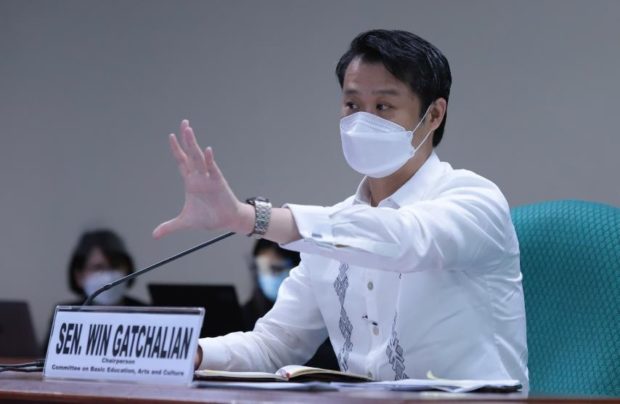Gatchalian on class opening: We ‘cannot claim complete victory’

Senate Committee on Basic Education, Arts and Culture chairman Sen. Win Gatchalian. Senate PRIB file photo / Albert Calvelo
MANILA, Philippines — “We cannot claim complete victory.”
Senator Sherwin Gatchalian said this a day after classes officially opened on Monday with both teachers and learners struggling with internet connectivity in the country’s shift to distance learning amid the pandemic.
“I cannot claim complete victory yesterday because if you look at the standpoint of parents and teachers, the lack of internet connectivity became the stumbling block,” Gatchalian, chair of the Senate basic education committee, said in an interview over ABS-CBN News Channel on Tuesday.
“In Valenzuela, we launched our own streaming school but without internet connectivity, it’s very difficult to deliver that all the way to the homes of our constituents, so I can only say it’s a partial victory insofar as class opening is concerned,” he added.
In her message for the opening of public school classes earlier, Education Secretary Briones said the Philippines is claiming “victory” against COVID-19 as it opens the school year amid the pandemic.
Article continues after this advertisementThe school year opening was initially scheduled on August 24 but this was moved to October 5.
Article continues after this advertisementAccording to Briones, the Department of Education (DepEd) as so far logged over 24.7 million students who have enrolled for this school year, which represent 89 percent of last year’s 27.85 million registered students.
Telcos need to ’step up’
With the shift to online learning, Gatchalian urged telecommunications companies to “step up” and improve their services.
“The telcos should step up. It’s now in the hands of our telcos to step up and to make sure that connectivity is available to all of our students…We have to use all tools available and I’m looking at the point of view of our parents and students and I’ve seen first hand that connectivity is a problem,” the senator said.
“This is an eye opener for us, moving forward, because if you want to step in into the new normal or the better normal, we have to improve connectivity,” he added.
Aside from online classes, in-person delivery of learning materials to the homes of the learners will also be used.
Teaching with the use of radio and television, meanwhile, will be done for students who do not have access to a computer or the internet.
Gatchalian underscored the importance of ensuring that both the modules as well as television and radio broadcasts are delivered effectively to the students.
“We have to go back to the basics and the basics here is making sure that our children have the modules that they can follow and use to learn and another basic is for our teachers to be equipped to assess the student and also to make other modules or other devices for them to gage the student if they are learning or not,” the senator said.
“Another important component is TV and radio broadcast. We have to make sure that this broadcast is communicated properly because I also detected some students who don’t know what time a subject will come out,” he added.
Nevertheless, Gatchalian commended DepEd for its “utmost effort” to open classes.
“It’s a challenge. We’re looking at teaching 23 million students, equipping 900,000 teachers and non-teaching staff with the necessary tools to pursue class opening,” he said.
“This is really a big challenge,” he added.